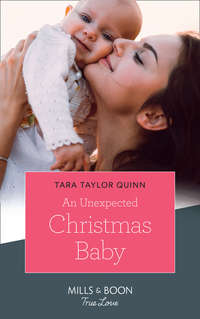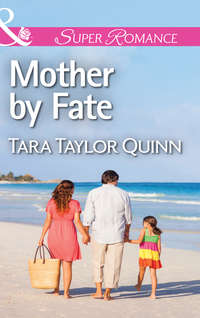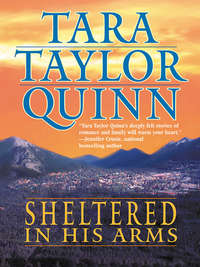
Полная версия
A Child's Wish

Praise for the Novels of Tara Taylor Quinn
“One of the skills that has served Quinn best…has been her ability to explore edgier subjects.”
—Publishers Weekly
“One of the most powerful Superromances I have had the privilege to review.”
—WordWeaving on Nothing Sacred
“Quinn writes touching stories about real people that transcend plot type or genre.”
—All About Romance
“Quinn explores relationships thoroughly…. Her vividly drawn characters are sure to win readers’ hearts.”
—Romance Communications
“Quinn’s latest contemporary romance offers readers an irresistible combination of realistically complex characters and a nail-bitingly suspenseful plot. Powerful, passionate and poignant, Hidden is deeply satisfying.”
—Booklist
“Somebody’s Baby is an exceptional tale of real-life people who are not perfect, feel heartache, make mistakes and have to find their inner strength…. Somebody’s Baby easily goes on my keeper shelf.”
—The Romance Reader Reviews
Where the Road Ends is “an intense, emotionally compelling story.”
—Booklist
Dear Reader,
Most of us, when we were children, spent a lot of time playing. As we grew up and responsibilities presented themselves, the child inside us was slowly buried. For some, the burial was complete and we forgot how to play at all. For many of the rest of us, playtime was minimal. We not only lost the “fun” that filled the majority of our waking hours, but we lost the ability to believe in things we couldn’t explain, to assume we’d be loved just because we existed, to wish for something with any expectation of receiving it.
A Child’s Wish is the story of a woman who didn’t lose that ability to listen to her heart, who didn’t lose the ability to believe in the things she couldn’t explain. It’s also the story of a child whose greatest wish, and her attempts to achieve it, could cost her her life. And it’s the story of a man who trusts only what he can explain with his head, not his heart.
A Child’s Wish feels, in part, like my own autobiography. While all the events are pure fiction, the catharsis, the coming of age, by all three of the story’s major players touched me personally. This story gave me hope and joy; it gave me not only the reminder, but the license, to play. I hope you can find the freedom to believe what your heart tells you, no matter where it leads—even if it goes against the crowd. I wish you all joy in life. I’m off to play now….
Tara Taylor Quinn
P.S. I love to hear from readers. You can reach me at P.O. Box 133584, Mesa, Arizona 85216 or through my Web site, www.tarataylorquinn.com.
A Child’s Wish
Tara Taylor Quinn

For Kevin, Rachel, Mom and Sherry, the daily recipients of my intensity, who hang around in spite of me. You are the culmination of my deepest wishes and I am grateful for you every single day.
Acknowledgment
Many thanks to Maricopa County Sheriff’s Office Deputy David Parra for his generous contribution to the technical aspects of this book. And for the kindness, respect and humor with which he handled my ignorance.
CONTENTS
CHAPTER ONE
CHAPTER TWO
CHAPTER THREE
CHAPTER FOUR
CHAPTER FIVE
CHAPTER SIX
CHAPTER SEVEN
CHAPTER EIGHT
CHAPTER NINE
CHAPTER TEN
CHAPTER ELEVEN
CHAPTER TWELVE
CHAPTER THIRTEEN
CHAPTER FOURTEEN
CHAPTER FIFTEEN
CHAPTER SIXTEEN
CHAPTER SEVENTEEN
CHAPTER EIGHTEEN
CHAPTER NINETEEN
CHAPTER TWENTY
CHAPTER ONE
“MS. FOSTER, are you alone?” Startled as the loudspeaker sounded in her third-grade classroom during her Thursday-afternoon planning period, Meredith glanced up from the sloppily scrawled math problem she’d been trying to decipher.
“Yes, Mr. Shepherd.” She used the formality, just as she always did when anyone else was around—or could possibly be around.
“Could you come down to my office?” The principal’s inner sanctum—the only place in the building where one could be guaranteed an uninterrupted meeting.
Meredith dropped the purple pen she’d been using to grade papers.
“Yes, Mr. Shepherd. I’ll be right there.”
The beautiful March day had just taken a nosedive. She was in trouble again.
“YOU’RE THE BEST teacher I’ve ever had, Meredith. Year after year, your students average higher scores than any other students in the district on both national and local aptitude tests.”
“I know.” Hands clasped in her lap, one thumb rubbing the opposite palm, Meredith added, “Thank you.”
“You’re also the teacher who brings me the most parental phone calls.”
She occupied one of the two wooden armchairs in front of the scarred but spotless desk while the principal, dressed in casual slacks, cotton shirt and tie, stood at the window behind it.
“I know.”
“Those parents pay my salary.”
“I know.”
“And yours.”
She nodded, pulling her hair in the process as her waist-length ponytail got caught in the corner of the chair’s arm.
“Some of them make up the school board and the superintendent who oversee us.”
It must be bad.
“They are the community that—”
“Mark, I get the picture,” Meredith interrupted. “Mr. Barnett called.” She was only guessing, but it didn’t take a psychic to figure it out.
“He got me at home last night—during dinner.”
“I’m sorry.” For what, she wasn’t sure. Causing him aggravation, certainly. Interrupting his dinner, of course. But for telling the boy’s divorced mother that she suspected Tommy’s father was emotionally abusing him—no.
“You not only created grief that we didn’t need, your conversation with Tommy’s mother yesterday afternoon resulted in a nasty fight between the boy’s parents.”
Unfortunate, to be sure.
“Which should be avoided at the cost of an eight-year-old boy’s safety?” She shifted and felt a sting as the back of her leg stuck to the wood. If she’d ever learned to tuck her skirt beneath her when she sat, as her mother had urged her to do for most of her life, that wouldn’t have happened. Instead, the long folds of colorful cotton flowed around her.
“You’re a third-grade teacher, Meredith, not the school counselor. Your job includes speaking to parents about scholastic concerns, reading problems, poor test scores or a lack of attention in class—not about unproved suspicions of suicidal tendencies.”
“So I should just let a kid kill himself or rip himself to pieces considering it? I should let his monster of a father continue to tear him down until he eventually believes there’s no point in being alive?”
“He’s eight years old!”
“A very mature eight years old.”
“There’s a protocol for these things. Professionals who are in place to help if you suspect trouble. People who are trained to deal with sensitive issues, with families and life tragedies.”
“I’ve talked to Jean twice. She talked to Tommy and said she didn’t think there was any need to call in the boy’s parents—or to speak with him again unless something else came up.”
“Jean’s been with us for four years. She has almost a decade of child psychology training and is highly respected in her field.”
That might be. But Jean Saunders lived completely in her head. If it wasn’t logical, if it didn’t fit a predetermined pattern, it didn’t exist. “She’s missing something with this one.”
“What did she say?”
“That he’s suffering from the usual apprehensions, guilt and insecurity of an only child pulled apart by divorce. That at most, his parents are using him to get at each other. Which they are.”
“Meredith…” The name was drawn out in warning. “You have no way of knowing that.”
She didn’t respond to his comment. There was no point. Mark wouldn’t listen.
“Tommy is considering suicide,” she said softly, instead. “His father has convinced him that he’s not a stable child and that he is the sole cause of his parents’ divorce.”
His father was rich, powerful and the current district attorney.
Mark’s eyes narrowed. “Has he said as much to you?”
“No.”
“But you overheard him talking to someone else? One of the kids?”
“No.”
He stood behind her and began to pace. “I’m guessing he didn’t write a paper on the topic.”
“He’s only in third grade. We’re working on learning cursive script, nouns and verbs, not creative writing.”
Mark settled against the edge of the desk, directly in front of Meredith. She wished he wouldn’t do that. His closeness made this all much harder. And it was hard enough already.
This was one of those days when she found it a tempting idea to turn her back on Mark Shepherd, walk right past his secretary in the outer office on the other side of the thick mahogany door and out of this Bartlesville, Oklahoma, school forever.
But she didn’t know what she’d do if she couldn’t teach. And there was Tommy—and others like him—to consider.
“I’ll call Mr. Barnett and apologize,” she said, glancing up at the man she might have dated if they hadn’t been working together, if sexual relations between colleagues at the same school hadn’t been against district policy—and if he’d ever asked. “And then I’ll call Mrs. Barnett and tell her I was out of line and to disregard what I said.”
“You know as well as I do that she won’t. The suspicion has been planted.”
Meredith stood, which made her just inches short of her boss’s six feet, allowing her to meet him eye to mouth. Frank, her ex-fiancé, was Mark’s height. It had been one of the few things she’d ended up still liking about him.
“I hope for Tommy’s sake that she won’t ignore it,” she said to him, standing her ground. “I hope she gets him into counseling and away from his father eventually.”
“All of which you absolutely are not going to say to her.”
No. Because she couldn’t do any good for anyone if she was out of work and away from the children she knew she was here to help. But it would be hard.
“He did it to her, too,” she said, facing him, the chair at the back of her legs. “That’s why it was so easy for her to believe that he was doing it to their son.”
“Let me guess, she didn’t tell you that. You just know.”
“No.” She shook her head, the colorful earrings dangling. “She told me.”
“TOUGH DAY AT WORK?” Susan Gardner slowly ran her fingers through Mark’s hair, back and forth. He loved it when she did that.
“Hmm,” he said, his eyes half closed as he lounged beside her on the couch. He’d listened to Kelsey’s bedtime prayers an hour ago, checked to make sure that her cat was curled up beside her and was only now starting to relax.
“I really admire your ability to spend your entire day with kids and not go crazy,” she said. “I wouldn’t have the patience.”
“I could never spend my days looking down people’s throats and up their noses,” he responded, grinning.
She chuckled, as he’d meant her to. “I do not spend my days looking up people’s noses,” she said, tugging gently on a strand of his hair. “I only do that once or twice a week. Now if you want to talk about peering into ears…”
He didn’t. Not really, though he greatly respected her ability. He spent his days refereeing, while Susan, an ear, nose and throat specialist, spent hers healing.
“Kelsey seemed awfully subdued tonight.”
Susan was being kind.
“She was rude,” he said, frustrated with his nine-year-old daughter. She’d always had such a big heart, her awareness of those around her advanced for her age. Lately, however, there were moments when she was a person he didn’t even know.
“She doesn’t like me.”
“It’s not you….” Mark turned his head, taking in the beauty of the woman beside him. Susan’s hair was short, dark, sassy. Her eyes big and luminous. Nothing like the long red-gold hair and soft green eyes of the woman who’d made his day ten times more difficult than it had needed to be.
He liked short, dark and sassy.
“Kelsey’s not used to sharing me.”
“We’ve been dating for almost six months.”
“But she had me to herself for almost three years before that.”
Her hand trailed down the side of his face to his neck. “I might believe that, if you two didn’t still have three nights a week alone,” she said and shook her head. “I’m not that great with children. I like them, I just don’t know how to relate to them. Put me in an operating room and I’m calm and confident, but leave me alone with a child who’s not a patient and I’m completely out of my element. I don’t know what to say.”
“You just talk to them,” Mark explained, touched by her earnestness. “They’re people like everyone else, only shorter.”
“They don’t think like adults.”
“So, you were a kid once. Think back to that.”
She sighed, resting her head against his shoulder. “I don’t ever remember being a kid. My folks had me on the fast track before I was five.”
Her parents were older; he’d met them several times. And she’d been something of a child prodigy. She was four years younger than he was and she’d been in medical school when he’d still been an undergraduate in college. She hadn’t had many chances to make friends her own age. He knew all this. He’d just never considered the possibility that her unusual upbringing might have robbed her of childhood thoughts as well as everything else.
“We’ll work on it,” he told her, reminding himself to think of some ways to do that. Tomorrow.
Tonight his mind was tired and his body was restless. He slid an arm around Susan, enjoying the slender shapeliness of her athletic body. She came to him eagerly, raising her mouth for his kiss.
They wouldn’t sleep together tonight. Mark never had sex in his house when Kelsey was home. But he needed to—tonight more than many other nights.
Her lips opened and he slid his tongue inside, finding the rhythm that had become familiar to them over the months, relishing her response. Until he reminded himself that he had to stop.
“Being a parent’s tough sometimes,” he said with a groan.
“Did you get a sitter for tomorrow night?” Susan’s whisper was hoarse and not quite even.
She’d invited him to her place for grilled steak—and a couple of hours in her bed.
“Not yet.” Mark’s mood dropped as the day—the week—came back to him. “It’s the spring dance,” he said. “But I have one more person to try.”
“If you can’t find anyone else, I’m sure Meredith would do it.”
“No.” Mark regretted his tone the second he’d responded. Regretted, too, that being friends with people at work wasn’t against policy—unlike dating. It would be a damned fine reason to keep Meredith Foster out of his life a whole lot more.
Susan leaned back to look at him. “Uh-oh.”
He didn’t say anything. He couldn’t. Meredith Foster was Susan’s best friend. Meredith had introduced them to each other.
“What’d she do?” Susan asked, her eyes serious, concerned, but with a hint of a smile on lips still wet from his kisses.
With as few words as possible, he told her. And wasn’t at all pleased when Susan sat back after a moment and said softly, “She’s probably right, you know.”
“No, I don’t know.” He was tired. Cantankerous. He’d been cussed out a second time by Larry Barnett that afternoon. His daughter was being snippy. He needed to make love. Meredith Foster was his scapegoat.
“How many times have you called her into your office over the past four years?”
Mark sank down on the couch, his feet on the floor straight out in front of him, his head resting against the cushion. “I have no idea. Too many.”
The lights were low, and soft new-age jazz played in the background. He should be relaxed.
“And how many times has she been wrong?”
“Every one of them. She steps outside her position, she apologizes and life goes on. Until it happens again. She’s a damn good teacher, Suze, I’d hate to lose her, but she butted heads with a powerful man this time and I don’t know how long I can keep explaining things away.”
“I mean about the kids, Mark,” Susan said, her voice filled with compassion—whether for him or her friend, he wasn’t sure. Knowing Susan, it was probably a bit of both. “How often has she been wrong about the kids?”
In a way, he resented her generosity. Meredith Foster deserved anger tonight, not compassion.
“She’s good with the kids, no one’s arguing about that.”
Susan straightened up on the edge of the couch, facing him. “How many times have her predictions turned out to be true?”
“I honestly couldn’t tell you,” he said. “The point is irrelevant. Anyone can guess and be right fifty percent of the time.”
“I’d bet my retirement fund that her percentage is closer to eighty or ninety than fifty.”
He highly doubted it—but he couldn’t prove either of them right without a hell of a lot more work than he had time for. Meredith Foster was stepping outside the boundaries of her position and she could cost both of them their jobs. If she’d wanted to psychoanalyze, she should have gone into psychology.
“What about Amber McDonald?”
“Who?” He opened an eye to glance at Susan. Other than her current choice of topic, she was good company. He was glad she was there.
“That little girl two years ago. She was being sexually abused by a family friend and no one suspected anything until Meredith came forward.”
She was Amber Walker now. Her mother had remarried and moved the child to a different state. Last he’d heard, she’d joined Girl Scouts and was starting to socialize a bit.
“Amber must have told her something,” he said.
“Testimony revealed that she’d been threatened and manipulated so completely that she couldn’t even tell the police, her mother or counselors about it—not even after the guy was arrested.”
He’d forgotten that. It had been a minute detail compared to the anguish everyone—including Mark—had experienced over the incident. That event had branded within him a fierce need to protect his daughter. He’d carefully screened the four teenage girls who were permitted to sit with Kelsey. And at no time, under any circumstances, were these girls to have anyone over when they were in his home. If there was an emergency, the police were to be called. Followed by him.
“Meredith felt it, Mark,” Susan said, her brow creased. “I know it’s hard to grasp, this gift of hers, but that doesn’t make it any less real.”
He stared at her, not sure what to say. He’d suspected that Susan put credence in Meredith Foster’s fantasies, but she’d never before actually come out and said so. They’d managed to avoid conversation on the subject until now.
He respected her right to believe whatever she believed. She just wasn’t going to convince him. It wasn’t logical.
“Has she ever known stuff about you without first being told?” he asked. He was somewhat curious to hear the answer, but he also hoped to show her the hole in her theory. Meredith and Susan had been friends since they were fifteen years old—having met at a church youth function and found common ground in their non-traditional lives.
“All the time.”
Mark’s eyes opened wide at her response. Susan was a medical doctor, for God’s sake. A scientist.
“Ten minutes after Bud died, Meredith was at my door. I was still in shock, hadn’t called anyone yet, and there she was.”
“You said she stopped by often during the last days of your husband’s fight with leukemia.”
“She did. But she always called first to see if Bud was awake. She didn’t want to impinge on what little time we had left together.”
“So maybe she was in the area.”
Susan shook her head. “She knew, Mark. She didn’t knock, she just used the extra key, came in and found me on the bed beside him sobbing….”
Mark’s throat tightened as Susan’s eyes filled with tears. He could see her need to believe—he hurt for the anguish she’d been through, and cared enough to let the rest go.
Pulling her against him he held her while she cried, rubbing her back, wanting to do whatever he could to ease a grief that he understood would be with her always. Three and a half years had passed since Barbie had walked out on him and Kelsey, and the ache still throbbed as intensely as ever during the dark hours.
“THESE ARE BAD MEN.”
Kelsey Shepherd leaned over on the stained couch to whisper to her mother. Two scary-looking old guys had come in from the garage door and they were putting something in the refrigerator. Kelsey thought they were gross.
Dad would kill her if he knew she was there with them.
Smiling, Barbie was shaking her head. “They’re fine,” she whispered back quickly and Kelsey stared at her. Was her mom okay? Even after all these times seeing her, she couldn’t get used to the short, choppy hair and no makeup and sloppy clothes. She remembered her mom being beautiful.
Of course, maybe that was just kid stuff.
“Don, sweetie, come on over and meet Kelsey,” Mom said. She squeezed Kelsey’s hand so hard her fingernails cut into Kelsey. “Kelsey, this is Don.”
The bigger of the two men, the one with the beard that mostly covered his mouth and made it so you couldn’t tell if he was smiling or getting ready to spit, came over, his big boots making a lot of noise on the tile floor, which, as far as Kelsey could tell, covered the whole house.
“Hi there!” he said, rubbing Kelsey’s head. She wanted to jerk away but she was afraid to upset her mom. Her mom wasn’t doing so good today. She was in one of those moods where she could be happy and then all of a sudden cranky.
“Hi,” she finally said, leaning into her mother.
“So your mom here tells me you’re in fourth grade.”
Another squeeze of her hand. “Uh-huh.”
“You like your teacher?”
I’d like it if you’d go away. “She’s okay.”
“You get good grades?”
“Uh-huh.”
Did Mom really live with this guy? When she could have Daddy?
“I’ll bet you have lots of friends, a pretty girl like you.”
Kelsey felt creepy. She wanted to leave.
Her mother’s nails bit into her hand again, reminding Kelsey that she hadn’t answered.
“Uh-huh.” If she didn’t love her mother so much, she’d never come back to this place, for sure. She hoped Mom wouldn’t make her. She liked driving around in the car more—even if it was old and rusty and had ripped seats and a bad smell.
“Cool.” Don smacked his lips, leaned down and gave her mother a wet, messy kiss that lasted so long she could smell that he stank. He slid a finger through the hole in the thigh of her mom’s jeans. Just when Kelsey was going to jump up and leave, Don stood and went out the garage door. Kelsey listened for a car, hoping he was leaving, but there was only quiet.
Mom let go of Kelsey’s hand and gave her a hug and a soft kiss like she used to do at bedtime. Kelsey almost had to wipe it off. She didn’t want any spit from that awful guy on her, anywhere.
“You remember that ‘fluffy puppy’ book we used to read?” her mom asked, like she’d read her mind or something.
“Yeah.” Kelsey still had it.
“Remember how the cover was all stained and torn?”
“Yeah.” She liked it that way.
“The story was still the best, huh?”
What was even better was that her mom remembered. And was talking like those days were important to her, too. “Yeah.”









